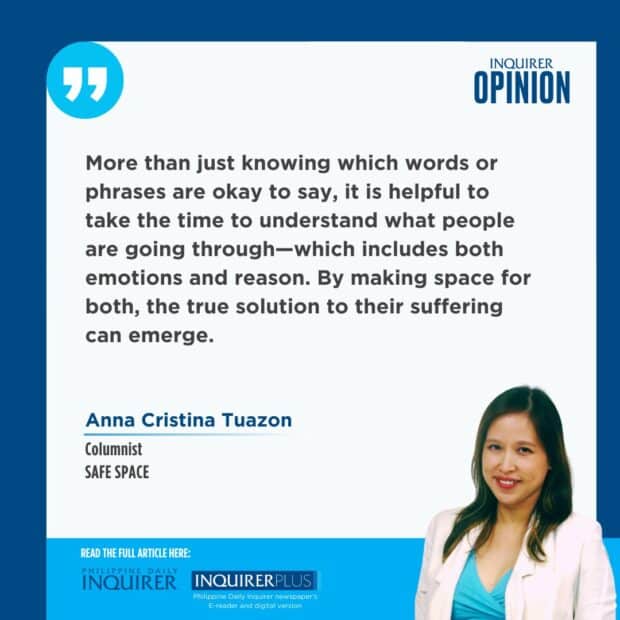Why we don’t ask why

September is Suicide Prevention Month. In psychotherapy class, we also just finished discussing how to manage suicide risk. My students, who major in different areas of psychology and do not necessarily plan to become practitioners, often get approached for such help whether they like it or not and so it is much better to be trained and prepared. One could work in a private company and have to help a coworker dealing with a crisis. Schools, all too often, have to contend with mental health crises among students and staff. There is no social context or setting untouched by the risk of suicide. As much as some of my students fear such a scenario, it is important to be ready and know what to do.
There are many misconceptions surrounding suicide. I have written such articles in the past, including the myth that talking about suicide increases the risk of suicide (“Mental health month (2): Myths, misconceptions” 10/12/23). We are making headway in clarifying that and it has become more and more acceptable for people to talk about it in a calm, straightforward manner. We now know that we must address suicide risk head-on, learn to listen with compassion and nonjudgment, and communicate openly about feelings and experiences that are unpleasant.
There is one recommendation in our guidelines on suicide risk assessment, however, that confused my students: Don’t ask “why.” As one student asked, how can we understand the suicidal thought without asking why? “Why” is a contentious word in psychotherapy. Some therapists avoid using it altogether, fearing that it only serves to increase rationalization and intellectualization rather than allowing our clients to stay in the mode of experience.
Rationalization is a defense mechanism which attempts to explain or justify thoughts, beliefs, emotions, or actions using logical reasoning. I see this a lot in my clients when they experience strong emotions and they attempt to justify it using logic, even though emotions can occur even without rational basis. You may notice this when someone attempts to justify aggressive behavior by insisting that it is only logical to respond in this manner (e.g., road rage, hitting a child or a partner).
Intellectualization is another version of this defense mechanism, this time with the person attempting to explain their thoughts and behavior using purely facts and logic as a way of avoiding the emotional aspect of their experience. This shows up when people prefer to use technical jargon or pop psychology terms to disinvite personal exploration of feelings. When such defense mechanisms come up in therapy, we invite them to describe their experience further and in plainer language. We ask them explicitly about how they felt and what their experience was like in order to bring them back to their experience instead of being a distant observer of themselves.
Which brings us back to why the question “why” may not be helpful. Asking why is asking people to explain themselves or to provide reasons for their thoughts, feelings, and actions. “Why are you depressed?” “Why did you fail Math?” “Why do you feel this way?” Oftentimes, people may genuinely not know the answer and we get the frustrating response of “I don’t know.” Asking “why,” especially when it comes to emotions, forces the person to view their feelings through the lens of reason which may be inappropriate and, ultimately, unhelpful. Ironically, by insisting to understand emotions solely through reason, people can develop irrational thoughts. This is where we get instances of self-defeating thoughts such as “I don’t deserve happiness” and “I do not have the right to feel sad.”
Rationalization and intellectualization can also end up justifying unjustifiable behavior. In the case of suicidal thoughts, asking them why can lead them to generate more justifications for why suicide is the solution to their suffering. Imagine if I asked you why you are sad. You will instantly focus on thinking of sad things. Thinking of these sad things strengthen the feeling of sadness. Asking “why” can reinforce the emotion. And so, with suicide, we can risk reinforcing justifications for it.
We can understand a person’s suicidality without having to ask “why.” Instead, we can ask them what happened, which encourages them to realize that their spike in suicidal urge may be situation-specific. By tying it to a situation, we make room for the possibility that the urge will not last forever and they can feel differently in time. When we can link it back to a situation, we also make problem-solving possible, therefore greatly reducing hopelessness and helplessness.
There are many do’s and don’ts when it comes to helping someone manage their suicide risk. More than just knowing which words or phrases are okay to say, it is helpful to take the time to understand what people are going through—which includes both emotions and reason. By making space for both, the true solution to their suffering can emerge.
—————-
aatuazon@up.edu.ph
















